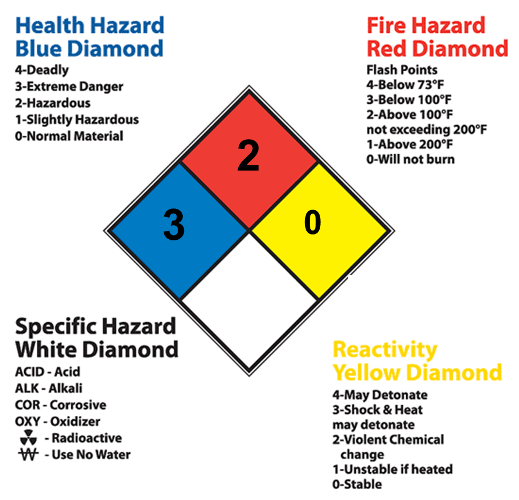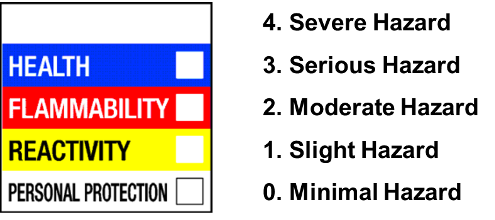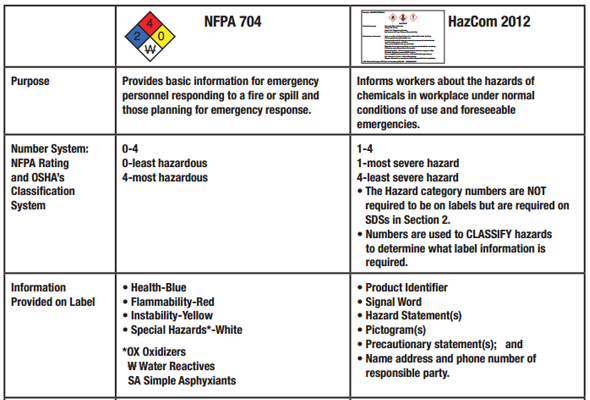US NFPA Ratings
Little Pro on 2015-12-30
NFPA 704 rating system is a standard system developed by the U.S.-based National Fire Protection Association (NFPA) for indicating the health, flammability, reactivity and special hazards for many hazardous chemicals through the use of the NFPA 704 Diamond. In this article, we will give you a brief introduction to NFPA rating criteria and compare NFPA 704 labels with HMIS labels and the new GHS labels under OSHA's revised Hazard Communication Standard (HCS).
NFPA Rating Criteria and NFPA Labels
The picture below shows NFPA rating criteria and a typical NFPA 704 label. Different colors represent different types of hazards. A number rating system of 0-4 is provided to rate each of the four hazards and is placed on a placard. 0 represents the least hazardous while 4 represent the most hazardous.

If you are interested in finding out detailed NFPA rating criteria in text, please click this Wikipedia summary
Comparison of NFPA 704 Labelling and HMIS Labelling
Hazardous Materials Identification System (HMIS) is a voluntary hazard rating scheme developed by American Coating Association (ACA) to help employers comply with workplace labeling requirements of the U.S. Occupational Safety and Health Administration's (OSHA) revised Hazard Communication Standard (HCS). HMIS also communicates in-plant chemical hazard information through the use of colors, numbers and letters of the alphabet (see example below).

As two popular workplace labelling systems in pre-GHS area in the United States, HMIS and NFPA labeling systems do appear quite similar; both have four sections colored blue, red, yellow and white. However, there are many differences between HMIS and NFPA labels.
| Target Audience |
|
| Label Shape |
|
| Health Hazard Communication |
|
| White Section |
|
NFPA 704 Labels vs OHSA HazCom Labels
Even though NFPA labels are not required by OSHA's Hazard Communication Standard (HCS 2012), they are not going to be replaced by OSHA's HazCom Labels (GHS Labels). There are many differences between NFPA 704 labels and OSHA HazCom Labels. For example, NFPA labels are usually posted on the two exterior walls of a facility, access to a room or storage area while OSHA HazCom Labels are affixed on chemical containers.
The picture below is an official comparison of NFPA 704 labels and HazCom 2012 Labels. By clicking the picture, you can download the full comparison.
Related Regulations and Standards
- OSHA's Hazard Communication Standards (2012);
- Hazardous Materials Identification System (HMIS) ;
- NFPA Ratings and NFPA 704 Labels;
- Globally Harmonized System of Classification and Labelling of Chemicals (GHS);
- Canada Workplace Hazardous Materials Information System (WHMIS);
More Readings: How to Determine NFPA 704 Ratings?
For many common chemical substances, NFPA 704 ratings have already been determined. You may click the link below to search them.
In the event that you need to determine your own NFPA ratings (especially for mixtures), you must get a copy of SDS first, obtain the information under the following sections of the SDS and assess them against NFPA 704 rating criteria provided above.
- Health hazard information under Section 11
- Flammability information under Section 9 (flash point, etc.)
- Instability information under Section 10
- Special information under Section 9, 10, 11
Reference & Resources
Click here to access all references and resources for USA including the English translation of regulations, regulatory lists and useful links to the websites of competent authorities.
Having Questions?
We do not provide consultancy services. If you have questions or need any help, please contact our sponsor. You may also find an expert in CSP business directory below. If you are a consultant, you may get yourself listed in CSP business directory (free) or sponsor this page to leave your contact info on this page..

Tags: Topics - USA, GHS Basics and Tutorials
